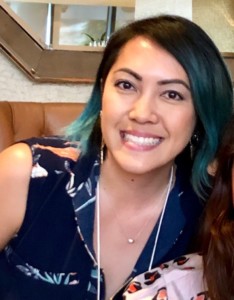We often worry about what world we will leave for the next generations; worry about how our actions today will impact the new generations to come. However, caring about the wellbeing of children today, in our current reality, is no small task, and one that all of us should partake on, I would add.
My Echos’ Alum interviewee this week is the lovely Rebecca Nguyen – or Bec, as she prefers to be called. Bec is a UX Designer at Telethon Kids Institute – an organisation that houses researchers, practitioners, policy-makers and funder to improve the health and wellbeing of children through research.
Below is what we talked about.
RG – Hey Bec! Could you tell our readers a little bit about yourself?
RN – My name is Bec Nguyen, and I’m Perth born and bred with Chinese and Vietnamese heritage. My hobbies include food – eating, not cooking! -, going to the movies, celebrating the arts – festivals, theatre, dance -, and travelling the world.
RG – You currently work as a Project Coordinator (Digital Health and UX Design) for the Telethon Kids Institute. Could you tell us about your current role and what it entails?
RN – Telethon Kids Institute (TKI) is Western Australia’s largest child health research institute. My role involves leading, consulting and collaborating on a number of research projects that involve digital solutions, such as developing mobile apps and digital platforms that support data collection, dissemination and interventions.
RG – What is your current main project about?
RN – The main project I am currently coordinating is for CoLab – a join collaboration between TKI and the Minderoo Foundation focusing on early childhood education and development. We are developing a mobile app to support parents of children aged 0-5 and provide them with ‘in the moment’ activities to do with their child to support brain development using machine learning processes. We recently launched a campaign to support our projects called Bright Tomorrows, Start Today. (You can watch a short clip here).
RG – In your opinion, why is innovation important in your field of work?
RN – Innovation is important because the speed at which digital technology is progressing, and how much it influences children and young people, means we as researchers need to keep up by developing innovative solutions.
RG – When was the first time you heard about Design Thinking?
RN – I heard about Design Thinking when I first started working on a project at TKI in 2015, developing an app for young people to safely share images to reduce hard and cyberbullying. One of the researchers was studying design thinking and the time that I joined the team; we were asking young people to think of a digital solution to the problem of cyberbullying, prototyping ideas and testing with other students.
RG – You have attended our Echos’ Design Thinking Experience course. How do you think the knowledge you brought back to your company can positively impact your industry?
RN – The Echo’s Design Thinking course helped to tie in my existing knowledge of UX Design and the importance of changing the mindset of people around you to support the Design Thinking process. Attending the Echos’ Design Thinking course helped demonstrate how Design Thinking can be applied to any research problem. Applying Design Thinking to existing research projects will help support and provide evidence to other researchers at TKI, which will hopefully lead to more innovative solutions.
RG – What were your biggest learnings during Echos’ Design Thinking course?
RN – Biggest learnings included how Design Thinking could be applied to any real-world problem, and the importance of testing the prototype with the end user to gain different perspective and insights to the solution.
RG – Did you learn anything new about yourself whilst attending the course?
RN – Yes, I learnt that I have the confidence to approach strangers on the street to ask about testing our prototype and receiving valid responses. Another team member at the Design Thinking workshop who stopped a stranger to ask about whether they walked to work, received this reply: “I don’t walk!” (laughs).
RG – Are you currently working on any specific project and applying using Design Thinking methodologies?
RN – Another project I’m consulting with is an app to help young people with Type1 Diabetes to exercise safely, and another app project encouraging sun safe practises in secondary school students. In these projects, I facilitate UX Design Thinking workshops with young people to help come up with how the app should function, and the look and feel of the design to keep users motivated and engaged with the app. I then develop wireframes (a mock version of the app) to then test it again with the group before we outsource to local app developers to build the app.
RG – That’s interesting, could you expand on these projects a bit more?
RN – These projects involve UX Design thinking which is very similar to the Design Thinking methodologies. The first project is developing an app to provide children and young people with T1 Diabetes to exercise safely. The second is The Sun Safe Project, developing an app for secondary school students to inform them about vitamin D, UV-index and promote safe sun practices. The third is developing an app for an iOS iPhone and Apple Watch for young males with Duchennes Muscular Dystrophy to prompt them to stand in their specialised standing wheelchairs. For the T1 Diabetes and Sun Safe Project, we’ve used an abridged version of the UX Design Thinking process whereby I’ve conducted one on one interviews with the end users, but then follow this up with a workshop so that the students can get together and discuss the interview questions and answers, then develop prototypes together and test. We then brainstorm and prioritise the most important features that can potentially be used for the app.
RG – In your opinion can Design Thinking create social change?
RN – I think so!
RG – What pearls of wisdom would you share with someone who is starting their innovation journey through Design Thinking?
RN – Be willing and open to new ideas and processes of Design Thinking, especially if it’s different from the processes that you’re used to doing.
RG – Do you have any final thoughts or learnings?
RN – I learnt how incredibly important it is to involve the end user throughout your process. Even if you’re an expert in your field, if you’re not the end user, your expertise can only take you so far. Understand and accept the importance of being able to test prototypes with end users as they will bring an entirely new perspective of the design and be able to provide valuable feedback to help shape a solution.
RG – I like to end interviews asking people to share a quote that inspires them. Do you have one?
RN – As an ex-Apple employee, I really can’t go past this quote from the late Steve Jobs:
“Here’s to the crazy ones, the misfits, the rebels, the troublemakers, the round pegs in the square holes… the ones who see things differently — they’re not fond of rules… You can quote them, disagree with them, glorify or vilify them, but the only thing you can’t do is ignore them because they change things… they push the human race forward, and while some may see them as the crazy ones, we see genius, because the ones who are crazy enough to think that they can change the world, are the ones who do.”
RG – Thank you so much, Bec!
RN – Thank you!
—
Follow us on social
Instagram – Facebook – LinkedIn – Youtube
How Can We Help?
For training and Innovation Journeys in your company: check out our in-house course offering
For upcoming courses in your region: visit our website.
If you have a special project and would like to use Echos’ consultancy services: send us an email.
Want to speak to a real person? Call us on 1300 502 006



